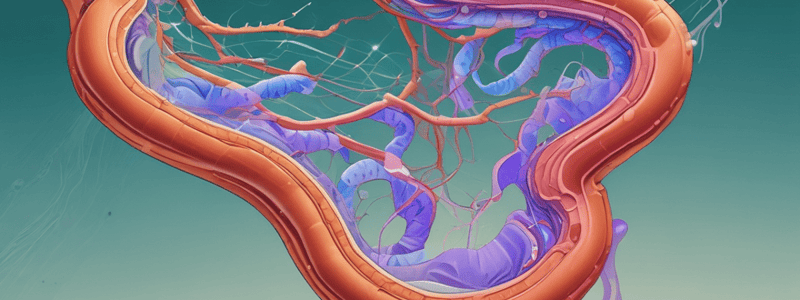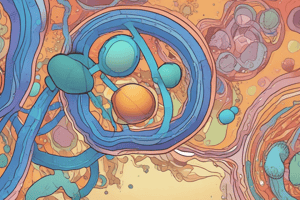Podcast
Questions and Answers
What is the scientific study of?
What is the scientific study of?
- only ecosystems and ecological systems
- life and living organisms (correct)
- only genetics and development
- only cells and molecules
What is the process by which cells convert food into energy?
What is the process by which cells convert food into energy?
- Cell cycle
- Cellular respiration (correct)
- Mitosis
- Cell division
What is the primary function of meiosis?
What is the primary function of meiosis?
- Production of new cells
- Creation of sex cells (correct)
- Cellular respiration
- Growth and maintenance of an organism
What is the study of inheritance and variation of inherited traits?
What is the study of inheritance and variation of inherited traits?
What is the process of formation of an organism from a single fertilized egg?
What is the process of formation of an organism from a single fertilized egg?
What is the result of mitosis?
What is the result of mitosis?
What is the main focus of immunology?
What is the main focus of immunology?
Which area of biology involves the study of neurons and their interactions?
Which area of biology involves the study of neurons and their interactions?
What is the main goal of environmental and ecology studies?
What is the main goal of environmental and ecology studies?
What is the study of molecular biology focused on?
What is the study of molecular biology focused on?
Which area of biology is responsible for understanding the development of complex multicellular organisms?
Which area of biology is responsible for understanding the development of complex multicellular organisms?
What is the main focus of biology as a whole?
What is the main focus of biology as a whole?
Flashcards are hidden until you start studying
Study Notes
Biology is the scientific study of life and living organisms. It encompasses a vast array of topics, from the microscopic world of cells and molecules to the larger ecosystems and ecological systems. In this article, we will discuss some of the major topics in biology, including cellular processes, genetics, development, immunology, molecular biology, neurobiology, and environmental and ecology.
Cellular Processes
Cellular processes are the fundamental building blocks of life. They include cellular respiration, a process by which cells convert food into energy, and the cell cycle, a series of events that result in the production of new cells. Mitosis and meiosis are two primary cell division processes, with mitosis responsible for the growth and maintenance of an individual organism, while meiosis is involved in the creation of sex cells, leading to the formation of new species through sexual reproduction.
Genetics
Genetics is the study of inheritance and the variation of inherited traits. It involves the study of genes, which are the basic units of heredity, and their interaction with the environment. Understanding genetic principles has led to advances in medicine, as well as the development of techniques for engineering organisms for various purposes, such as agriculture and biotechnology.
Development
Developmental biology is concerned with the processes leading to the formation of an organism from a single fertilized egg. It includes studies on cell differentiation, signaling pathways, and gene regulation, which are crucial for understanding the development of complex multicellular organisms.
Immunology
Immunology is the study of the immune system, which is responsible for protecting the body against infection and disease. It involves the study of various types of immune cells, their functions, and the molecules they produce to recognize and eliminate foreign substances.
Molecular Biology
Molecular biology is the study of the structure and function of molecules that are essential for life, such as DNA, RNA, and proteins. It involves techniques for studying these molecules, including gene cloning, DNA sequencing, and protein crystallography.
Neurobiology
Neurobiology is the study of the nervous system, which is responsible for controlling and coordinating the body's functions. It includes the study of the structure and function of neurons and their interactions, as well as the role of neurotransmitters and other signaling molecules in communication between cells.
Environmental and Ecology
Environmental and ecology studies focus on the relationships between organisms and their environments. They cover various aspects of ecology, such as population dynamics, community structure, and ecosystem processes. These studies are crucial for understanding the effects of human activities on the natural world and for developing strategies for conservation and sustainability.
In conclusion, biology is a vast and diverse field, with numerous subdisciplines and areas of research. The study of biology has led to significant advancements in various fields, from medicine and agriculture to technology and environmental science. As a biology student, you will have the opportunity to explore a wide range of topics and contribute to our understanding of the natural world.
Studying That Suits You
Use AI to generate personalized quizzes and flashcards to suit your learning preferences.





